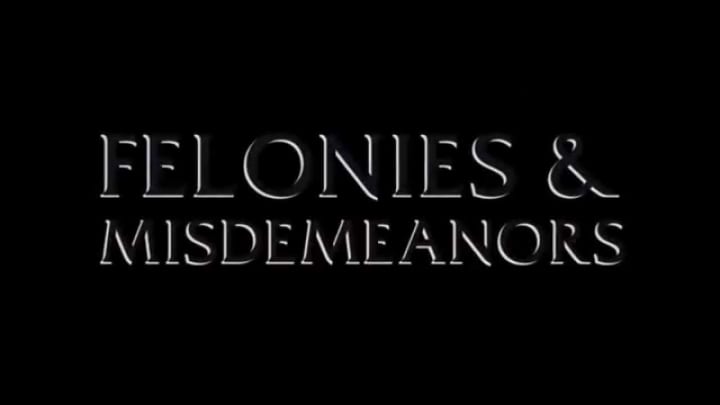What is Criminal Law?
Stay out of the slammer by better understanding the intricacies of criminal law.

The United States justice system is divided into two separate realms: civil law and criminal law. Civil law is considerably less serious, and it usually comes down to two parties against each other, with one party claiming the wrongdoing of the other and wanting compensation. These won't result in any jail time, but the grievances can range from petty to serious. Now, we come to the question with much more severe implications: what is criminal law?
Criminal Law deals with the committing of crimes, in which one or multiple state and/or federal laws have been broken. After an individual breaks a law in the United States, criminal charges will likely be filed. As far as criminal procedure goes, the seriousness of the charges will influence what avenue you're funneled into. Criminal trials come with jail time, and where you are tried will be at the discretion of the United States district attorney.
Read on further to get more details on the inner-workings of the criminal justice system.
Felony vs. Misdemeanor

In criminal law, crimes are separated into two categories: felonies and misdemeanors. These crimes have different levels of severity, and they both come with their own guidelines and maximum prison sentences. A felony is reserved for the most serious of crimes, and these crimes can be punishable by death (in certain states), and minimum one year prison sentences (can be less at the judges discretion).
Most states' criminal law systems divide these felonies into subcategories, and they will then come with their own set of penalties, usually set on precedent. Some of these felonies include: murder, rape, manslaughter, robbery, and racketeering.
Less serious in nature but still with the potential to land you in jail are misdemeanors. They come with a maximum sentence of one year in prison, but generally with a competent lawyer this can be substantially reduced and possibly negated. However, you will be paying some hefty fines for sure. Simple assault and battery, traffic violations, petty theft, and public intoxication are all examples of misdemeanors that can all put you in the cross hairs of criminal law.
Types of Crimes
You still might be wondering how many different types of crimes there are. We all know murder and robbery are crimes, but sometimes these crimes might fit into grey areas, which makes it all the more important to understand criminal law. It's crucial to comprehend actus reus, which is the objective element of a crime.
Criminal statutes take up 27,000 pages of federal code, so it's not possible to know all of them—some are actually absurd laws—but it would suit you to be familiar with most. Some of these serious crimes include sex crimes, drug crimes, violent crimes, domestic crimes, gun crimes, traffic crimes, and theft. There are a host of white collar crimes, too, including bribery, embezzlement, anti-trust, fraud, kick-backs, and money laundering.
Many of these fall into the category of federal offenses, and these will be met with the full weight of the United States justice system. All of these crimes splinter off into a plethora of other related offenses, but these are all mainstays of criminal law.
Criminal Lawyers

Criminal Lawyers are tasked with defending those accused with committing crimes, and many times they can be heinous. Despite what it may look like, in order to uphold criminal law they must defend their clients with the utmost sincerity and vigor. Under the law, those being accused are innocent until proven guilty—which can be more difficult than it seems.
A great lawyer will investigate the case fully as if they were law enforcement, because the better they understand it, the easier they'll be able to defend their client. In addition, they have to introduce doubt to make it less likely a jury or judge will convict. Also, instead of standard criminal trials, a savvy lawyer can negotiate law deals that'll greatly benefit the accused. If they can't build a strong enough case to get the charges dropped, they might have to fight it out in chambers going all the way up to the supreme court.
Mens Rea
Finally, mens rea is a crucial element of criminal law, as it's the test of criminal liability. It is needed to convict a particular defendant of a particular crime under almost every scenario. It is a Latin phrase that loosely translates to the idea that the person can't be culpable if the mind is not guilty, as somebody who acts without mental fault cannot be found guilty under United States criminal law. In addition, it's examined in many of the books that make you rethink the system, as it's not always fully practiced; we have executed hordes of mentally handicapped people in this country.
It is a bedrock of criminal justice and criminal procedure. However, this in no way means you can act with carelessness and not be convicted of a serious crime. Mens rea is vital to fully understanding the full spectrum of criminal law in America.
About the Creator
Bill Shaffir
Lover of gangster films and worried about the future of artificial intelligence.






Comments
There are no comments for this story
Be the first to respond and start the conversation.